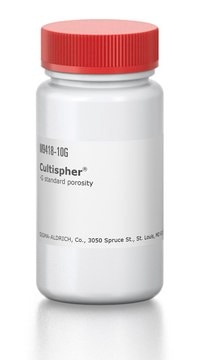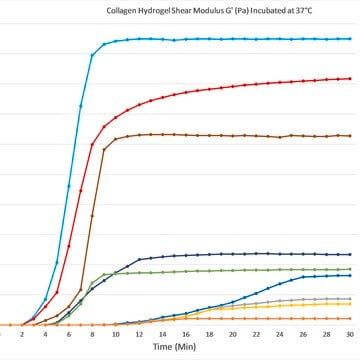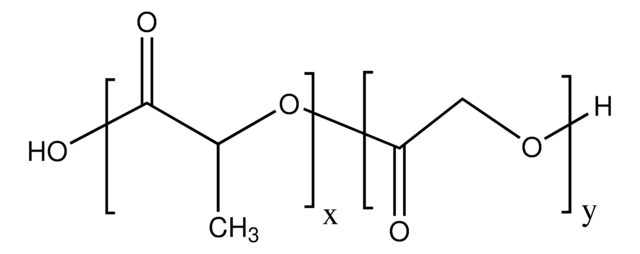5138
Human Collagen Type I
SphereCol® coated beads
Autenticatiper visualizzare i prezzi riservati alla tua organizzazione & contrattuali
About This Item
Codice UNSPSC:
12352202
NACRES:
NA.75
Prodotti consigliati
product name
SphereCol®, Human Collagen Type I Coated Beads, for 3D bio-scaffold
Origine biologica
human
Sterilità
irradiated
Forma fisica
liquid
Confezionamento
pkg of 10 g
tecniche
cell culture | mammalian: suitable
Dimensioni delle microsfere
~125-212 μm
Temperatura di conservazione
room temp
Descrizione generale
SphereCol® human Type I collagen coated beads are ideal for growing cell in suspension. The collagen coated beads provide a natural in vivo-like environment to promote high cell growth while providing a large surface area for cells to attach with optimal surface area to volume ratios. SphereCol® provides a 3D bio-scaffold which is optimal in many cell culture procedures.
SphereCol®, human collagen coated beads are coated with highly purified Type I human collagen derived from a human fibroblast cell culture process, VitroCol. The collagen provides an optimal coating on the beads to enhance cell attachment, cell viability, cell proliferation and cell function. The collagen beads range in size from about 125 to 212 micron.
SphereCol®, human collagen coated beads are coated with highly purified Type I human collagen derived from a human fibroblast cell culture process, VitroCol. The collagen provides an optimal coating on the beads to enhance cell attachment, cell viability, cell proliferation and cell function. The collagen beads range in size from about 125 to 212 micron.
Applicazioni
SphereCol®, human collagen coated beads provide a surface area of 360cm2/gram of beads.
Note legali
SphereCol is a registered trademark of Advanced BioMatrix, Inc.
Codice della classe di stoccaggio
10 - Combustible liquids
Classe di pericolosità dell'acqua (WGK)
WGK 3
Punto d’infiammabilità (°F)
Not applicable
Punto d’infiammabilità (°C)
Not applicable
Certificati d'analisi (COA)
Cerca il Certificati d'analisi (COA) digitando il numero di lotto/batch corrispondente. I numeri di lotto o di batch sono stampati sull'etichetta dei prodotti dopo la parola ‘Lotto’ o ‘Batch’.
Possiedi già questo prodotto?
I documenti relativi ai prodotti acquistati recentemente sono disponibili nell’Archivio dei documenti.
I clienti hanno visto anche
Romel Dator et al.
Chemical research in toxicology, 33(8), 2087-2098 (2020-04-16)
African American (AA) smokers are at a higher risk of developing lung cancer compared to whites. The variations in the metabolism of nicotine and tobacco-derived carcinogens in these groups were reported previously with the levels of nicotine metabolites and carcinogen-derived
Zhenzhen Meng et al.
Journal of cellular physiology, 235(2), 932-943 (2019-06-27)
Histone demethylase KDM7A regulates neuronal differentiation and development in mammals. In this study, we found that KDM7A was also required for breast cancer stem cells (BCSCs) maintenance. Silencing KDM7A significantly reduced the BCSCs population and mamosphere formation in vitro, and
Liu Ying et al.
International journal of biological sciences, 16(12), 2180-2191 (2020-06-19)
The histone H3K9 methyltransferase SETDB2 is involved in cell cycle dysregulation in acute leukemia and has oncogenic roles in gastric cancer. In our study, we found that SETDB2 plays essential roles in breast cancer stem cell maintenance. Depleted SETDB2 significantly
Xiaoyan Wen et al.
Nephron, 144(12), 644-649 (2020-10-23)
Urinary tissue inhibitor of metalloproteinases (TIMP)-2 has been identified as a predictive marker for acute kidney injury (AKI), including sepsis-associated AKI (S-AKI). Whether TIMP-2 might be causally related to AKI and hence represent a viable drug target is unclear. The
Songjie Cai et al.
Scientific reports, 10(1), 14249-14249 (2020-08-30)
Solid organ transplantation is a lifesaving therapy for patients with end-organ disease. Current immunosuppression protocols are not designed to target antigen-specific alloimmunity and are uncapable of preventing chronic allograft injury. As myeloid-derived suppressor cells (MDSCs) are potent immunoregulatory cells, we
Il team dei nostri ricercatori vanta grande esperienza in tutte le aree della ricerca quali Life Science, scienza dei materiali, sintesi chimica, cromatografia, discipline analitiche, ecc..
Contatta l'Assistenza Tecnica.










